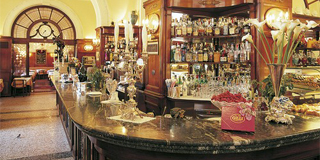Caffè Gilli
Piazza della Repubblica
36-39r
Gilli is Florence Switzerland La Bottega Dei Pani
Dolci” on Via Calzaiuoli; they changed location in 1860, moving to Via degli
Speziali, and in 1890 they sold the café to another Swiss family, the
Frizzonis. In the 1920s Gilli moved to its current premises and became a literary café that attracted
the most famous artists of the time: the Futurists (Marinetti, Soffici,
Boccioni, Carrà, Palazzeschi...). The perfectly conserved rooms and
furnishings from that period make Gilli
the only surviving Belle-Epoque café in Florence
Caffé Concerto Paszkowski
Piazza della Repubblica
31-35r
Originally
called Caffè Centrale, this landmark first opened its doors in 1846.
It was purchased
in 1904 by the Paszkowski family from Poland
During the
early part of the 20th century, it served as a meeting place for
artists, writers and journalists. After World War II the location was renovated
and once again became the haunt of intellectuals from that period, like the
poets of the Hermetic movement.
Today
Paszkowski remains one of the most elegant and classic cafés in Florence
Rivoire
Piazza della Signoria 5r
Enrico Rivoire of Turin Florence in 1872 and opened
his chocolate factory, where Florentines soon learned to savor the fine chocolates
and delicious hot chocolate typical of the Savoy
thanks also to its splendid location
directly across from Palazzo Vecchio in Piazza della Signoria.
In 1977, the Bardelli brothers took over
the business and have maintained the traditional methods of toasting cocoa
beans and preparing and packaging their products. Rivoire boasts many
specialties, all made according to the original recipes using a high percentage
of cocoa.
The beautiful original interiors, from the
early 1900s are alone worth a visit, but the experience of a sunset
illuminating the façade of Palazzo Vecchio while sipping a hot chocolate makes
it a must!
Giubbe Rosse
Founded in 1897 as the “Birreria F.lli
Reininghaus”, the café soon became a meeting point for the city’s large German
community, while Florentines dubbed it “le giubbe rosse” – the red jackets –
for the waiters’ unusual uniforms. Young Florentine intellectuals were
attracted by the international clientele and the fact that there was always an
abundance of periodicals and the venue soon became the birthplace and home of literary journals
and artistic movements. The habitués included Papini, Soffici, Palazzeschi, Gadda, Gatto, Pratolini,
Vittorini, and Montale.
After the Second World War, the café
reopened in 1947 but, like the city, it suffered a gradual decline. Since 1991,
under the management of the Smalzi brothers, a major effort is being made to
restore the café’s image and role as a place of cultural exchange and events.
Pasticceria Bar Ruggini
Via dei Neri 76r
Giuseppe Ruggini began baking pastries and
biscuits in 1914 on Via de’ Neri, one of the city’s most picturesque streets –
and his business soon flourished. The founder’s wisdom and skill have been
handed down through the years so that today, Riccardo, the third Ruggini pastry
chef offers his clients freshly baked goods daily, along with fine pralines and
chocolates also made on the premises.
The shop, which was expanded in 1989, is located in an historic building with a characteristic
single-arched brick ceiling. The oven, which dates back to the 1960s, still works
like a dream, turning out exquisite delicacies every day.







No comments:
Post a Comment